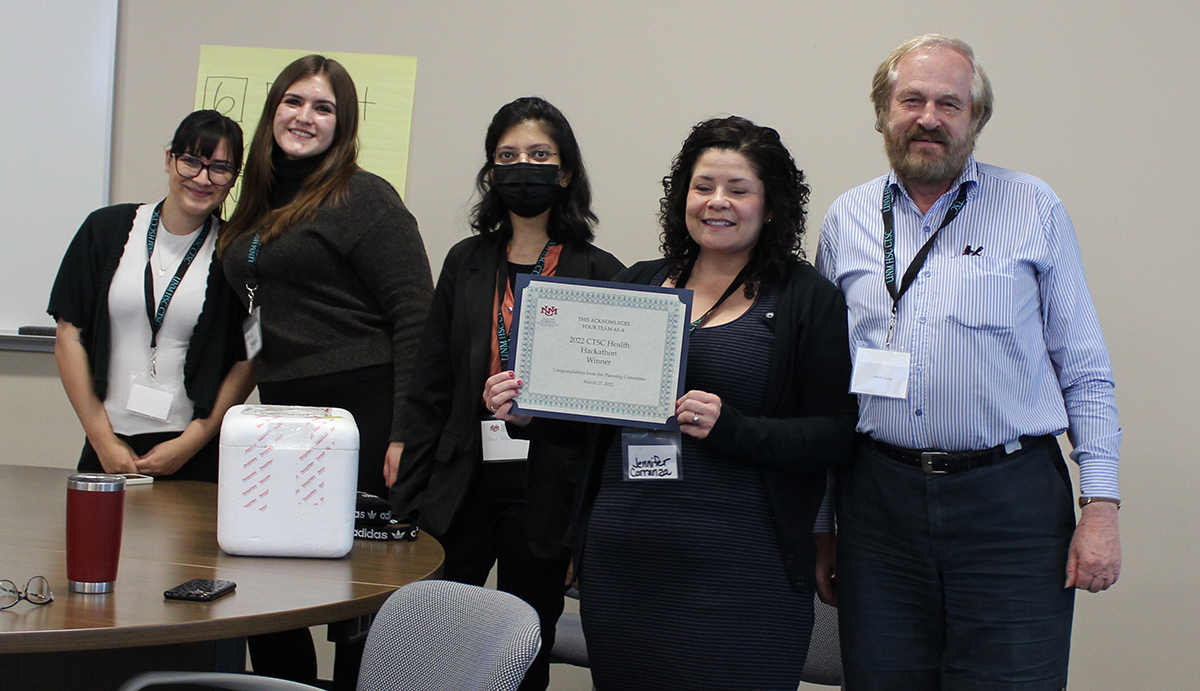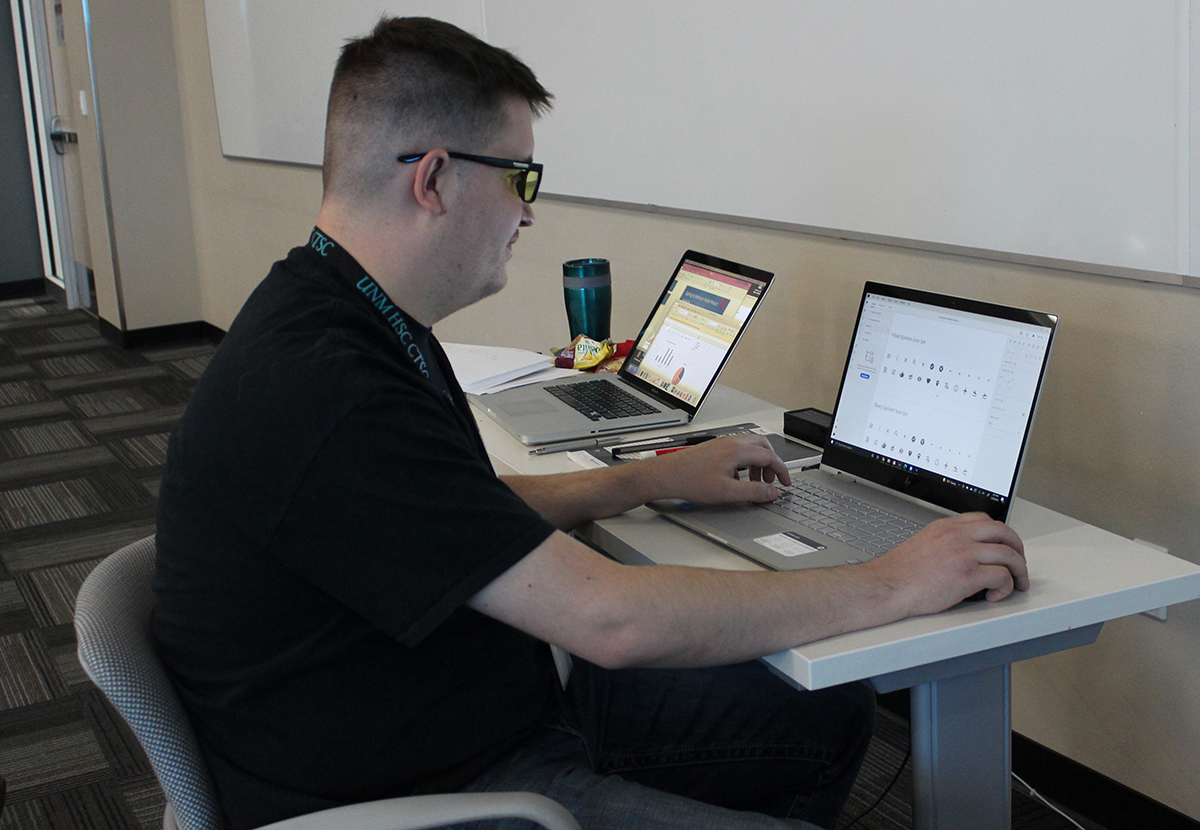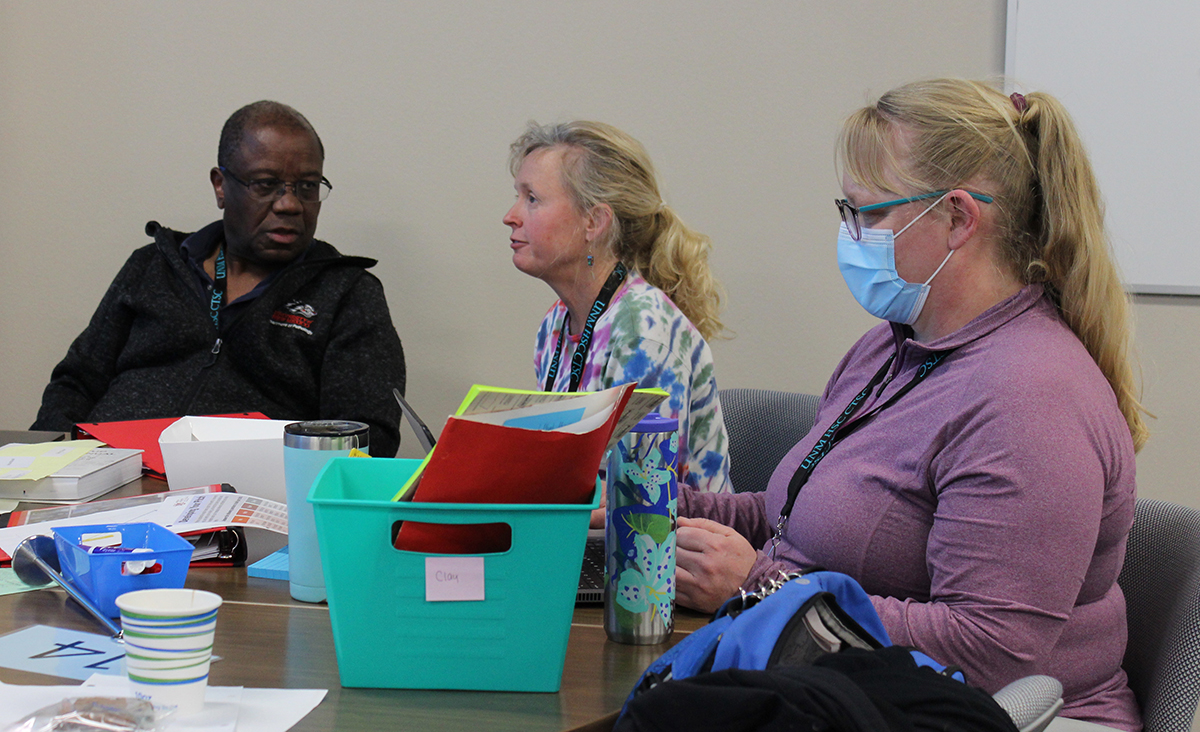Recent News
UNM Engineering team wins ASEE best paper for work on first-year engineering course
July 17, 2025
New director will enhance interdisciplinary engineering learning opportunities
July 2, 2025
Final SIRI cohort visits UNM campus
June 30, 2025
Perfetti receives ANS Landis Engineering Achievement Award
June 26, 2025
News Archives
Student housing, oral health, anti-racist app for surgeons winning ideas at 2022 CTSC Health Hackathon
March 29, 2022 - by Kim Delker
They came. They saw. They hacked.

Photo 1: Members of one of the winning teams, NanoPOD, at the awards announcement on Sunday.
After a two-year hiatus due to the COVID-19 pandemic, the 2022 Clinical and Translational Science Center (CTSC) Health Hackathon was back in person at the Domenici Center for Health Sciences Education North Wing at The University of New Mexico the weekend of March 25-27.
The CTSC Health Hackathon strives to stimulate innovation in healthcare, encourage multi-disciplinary collaboration, and foster creativity in a fun and competitive atmosphere.
Six teams participated in the event, which brought together individuals from diverse backgrounds — including students, educators, programmers, entrepreneurs, engineers, dental hygienists and physicians — to identify pressing healthcare challenges and “hack” a solution in the form of innovative technology.
Participants formed teams on Friday evening around ideas presented by fellow “hackers.” They spent most of Saturday analyzing the ideas and issues, brainstorming approaches, methods and solutions, as well as developing prototypes, business plans and their final Shark Tank-style pitch presentation. On Sunday, the teams pitched their ideas to a panel of judges, competing for a chance to apply for grants from the CTSC of up to $10,000 to help bring their ideas to life.
Three teams won the opportunity to continue pursuing their idea, with concepts running the gamut from addressing crises in UNM student housing and oral health to helping medical professionals embrace equity and inclusion in their practice.
One winning team developed an idea called NanoPOD, which uses nanotechnology to prevent oral disease by introducing nanoparticles into toothpaste and mouthwash. Iron oxide nanoparticles added to these products disrupt biofilms and kill harmful bacteria.
“Oral disease is a crisis,” said team leader Jennifer Carranza, a student in the dental hygiene master’s program. “Forty-seven percent of adults over the age of 30 have some form of periodontal disease, and it is preventable.”
Other members are Adreanna Rael, an undergraduate student in the College of Population Health; Mia Baca, an undergraduate in the Department of Chemical and Biological Engineering; Shruti Gharde, a Ph.D. student in the Optical Sciences and Engineering program; Mark Reymatias, a Ph.D. student in the Nanoscience and Microsystems Engineering program; and Marek Osinski, distinguished professor in the Department of Electrical and Computer Engineering, Computer Science, and Physics and Astronomy.

Photo 2: Computer science student Michael Millar works on the ASH student housing app on Saturday.
Another winning team tackled impacts on student health resulting from the lack of accessible student housing. Homeless young people experience higher rates of chronic health problems, trauma-related injuries and nutritional problems, according to Youth.gov. The Alternative Student Housing (ASH) app’s mission is to connect students in need of housing to nearby affordable and available residences. According to the team, 41% of UNM students experience a housing crisis at some point during their time at UNM.
Anthony Wallace said he was inspired to create this app after experiencing homelessness as a student in another state several years ago.
“This is personal for me because as a student, I had many scholarships, but spent 11 months on the street,” he said. “I now have housing security, but it took me many years. I wanted to create this app so this doesn’t have to be anyone else’s problem.”
In addition to Wallace, members of the team are Amelia Bierle (who was on a winning Hackathon team in 2020), an MBA student in the Anderson School of Management; John Schwitz, local entrepreneur; Michael Millar, an undergraduate in the Department of Computer Science; Marlene Brown, educator at CNM in photovoltaics and math; and Katrina Guinta, local businesswoman in social media marketing and management.
The third winning pitch, IDEA (Inclusion, Diversity, Equity and Anti-discrimination), was led by Ming-Li Wang, M.D., a UNM surgeon and associate professor, focused on creating an engaging, game-based app to help medical professionals recognize the impacts of bias and micro-aggressions on patients and alter behaviors in the workplace.

Photo 3: Members of the IDEA team collaborate on Saturday.
“There are documented cases of mistreatment of residents and patients,” said team member Mary Thelander Hill, an assistive technology professional. “What we hope to do is gamify the training and provide a friendly competition, while also educating medical professionals on issues of inclusion, equity and diversity.”
Workplace discrimination is detrimental, and research shows strong correlation that micro-aggressions lead to elevated levels of depression and trauma among minorities. It is believed that more effective training in recognizing symptoms and behaviors will benefit both patients and medical professionals, resulting in improved patient care.
The other IDEA team members are Joshua Benavidez, student; Tione Buranda, Ph.D., Department of Pathology; Michael McDonald, retired engineer; and Nancy Shane, UNM School of Medicine program evaluator.
Other ideas in the competition were developing an “electronic nose” to detect diseases like COVID-19, heart disease and cancer; an app to help nurture compassion in future healthcare providers; and an app that uses machine learning to detect indicators of inflammation, which is a major consequence of obesity and contributes to cardiovascular disease and diabetes.
Teams were judged on the content, impact to healthcare, quality, and clarity of their presentation, as well as the marketability and feasibility of the idea or technology.
The event is led and organized by the Clinical and Translational Science Center as part of their National Institutes of Health-funded grant. Gold sponsors were the Health Sciences Center Office of Research, the UNM Office of the Vice President for Research and the School of Engineering. Silver sponsors were ASCEND HUB, UNM Rainforest Innovations, the Anderson School of Management, the College of Pharmacy and the College of Nursing.
The event was co-chaired by Eric Prossnitz, Ph.D., distinguished professor of internal medicine, and Robert G. Frank, Ph.D., professor in the College of Population Health. Christina Salas, Ph.D., an associate professor in the Department of Orthopaedics and Rehabilitation, helped organize the event and provided 3D printing assistance for teams interested in designing prototypes of their technology. Salas is also special assistant to the dean of engineering for Health Science Center relations.
Judges for this year were Gregg Banninger, Ph.D., innovation manager for life sciences at UNM Rainforest Innovations; John Chavez, MBA, managing director of the New Mexico Start-Up Factory; Trish Lopez, founder of Teeniors; Stacy Sacco, MBA, lecturer in the Anderson School of Management and director of the UNM Small Business Institute; and Mathis Shinnick, director of corporate engagement at UNM Rainforest Innovations.
